Alfa Romeo Junior vs Hyundai i30 Wagon – Differences & prices compared
Everyday use, family trips or long-distance drives – here’s where the differences show.
Discover whether Alfa Romeo Junior or Hyundai i30 Wagon fits your lifestyle better.
Costs and Efficiency:
Price and efficiency are often the first things buyers look at. Here it becomes clear which model has the long-term edge – whether at the pump, the plug, or in purchase price.
Hyundai i30 Wagon has a minimal advantage in terms of price – it starts at 24800 £, while the Alfa Romeo Junior costs 25700 £. That’s a price difference of around 823 £.
Fuel consumption also shows a difference: Alfa Romeo Junior manages with 4.80 L and is therefore slightly more efficient than the Hyundai i30 Wagon with 5.70 L. The difference is about 0.90 L per 100 km.
Engine and Performance:
Power, torque and acceleration are the classic benchmarks for car enthusiasts – and here, some clear differences start to show.
When it comes to engine power, the Alfa Romeo Junior has a decisively edge – offering 280 HP compared to 140 HP. That’s roughly 140 HP more horsepower.
In acceleration from 0 to 100 km/h, the Alfa Romeo Junior is clearly quicker – completing the sprint in 5.90 s, while the Hyundai i30 Wagon takes 9.80 s. That’s about 3.90 s faster.
In terms of top speed, the Alfa Romeo Junior performs barely noticeable better – reaching 206 km/h, while the Hyundai i30 Wagon tops out at 197 km/h. The difference is around 9 km/h.
There’s also a difference in torque: Alfa Romeo Junior pulls evident stronger with 345 Nm compared to 253 Nm. That’s about 92 Nm difference.
Space and Everyday Use:
Cabin size, boot volume and payload all play a role in everyday practicality. Here, comfort and flexibility make the difference.
Both vehicles offer seating for 5 people.
In curb weight, Hyundai i30 Wagon is hardly perceptible lighter – 1316 kg compared to 1380 kg. The difference is around 64 kg.
In terms of boot space, the Hyundai i30 Wagon offers noticeable more room – 602 L compared to 415 L. That’s a difference of about 187 L.
In maximum load capacity, the Hyundai i30 Wagon performs distinct better – up to 1650 L, which is about 370 L more than the Alfa Romeo Junior.
When it comes to payload, Hyundai i30 Wagon somewhat takes the win – 524 kg compared to 420 kg. That’s a difference of about 104 kg.
Who comes out on top?
Overall, the Alfa Romeo Junior shows itself to be leaves the rival little chance and secures the title of DriveDuel Champion.
It convinces with the more balanced overall package and proves to be the more versatile choice for everyday use.
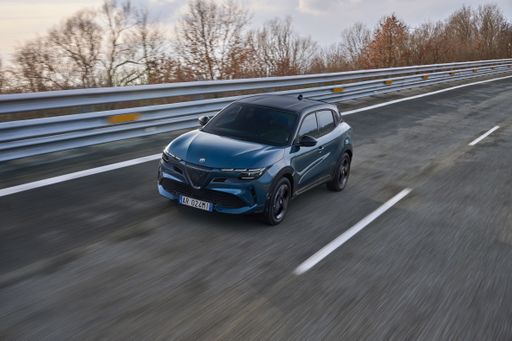 @ Alfa Romeo / Stellantis Media
@ Alfa Romeo / Stellantis Media
Alfa Romeo Junior
Alfa Romeo Junior
The Alfa Romeo Junior captures the essence of Italian design with its sleek lines and compact dimensions, making it an icon of elegance and performance. With a spirited driving experience and a charming retro aesthetic, it appeals to enthusiasts and casual drivers alike. This delightful car embodies the brand's rich heritage while remaining a fun and engaging option for those seeking a unique automotive experience.
details @ Alfa Romeo / Stellantis Media
@ Alfa Romeo / Stellantis Media
 @ Alfa Romeo / Stellantis Media
@ Alfa Romeo / Stellantis Media
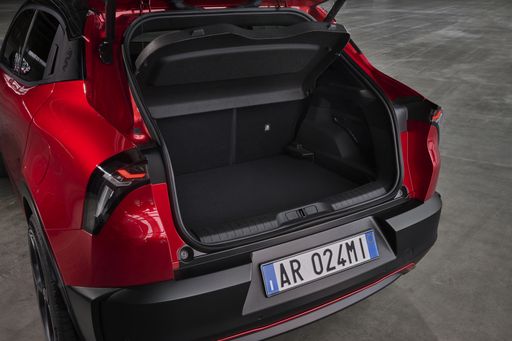 @ Alfa Romeo / Stellantis Media
@ Alfa Romeo / Stellantis Media
Hyundai i30 Wagon
The Hyundai i30 Wagon offers a blend of practicality and style, making it a popular choice for families and those in need of extra space. Its sleek exterior and comfortable interior provide a pleasant driving experience, while advanced safety features ensure peace of mind on the road. The i30 Wagon stands out with its impressive fuel efficiency and reliability, catering to both urban and rural lifestyles.
details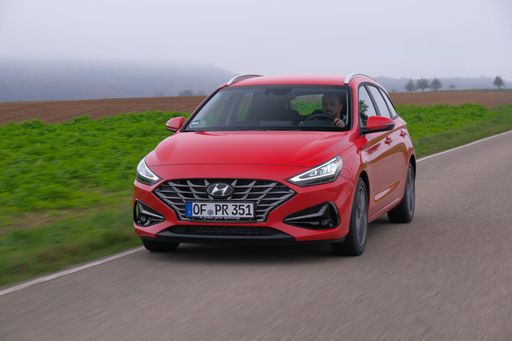 @ Hyundai Motor Company
@ Hyundai Motor Company
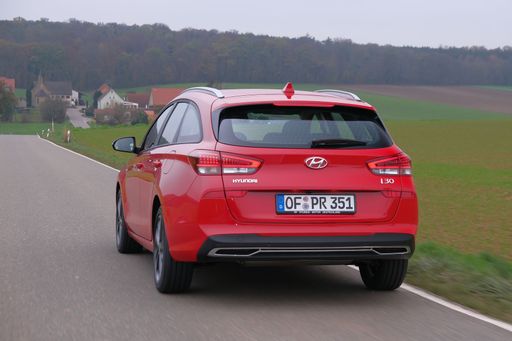 @ Hyundai Motor Company
@ Hyundai Motor Company
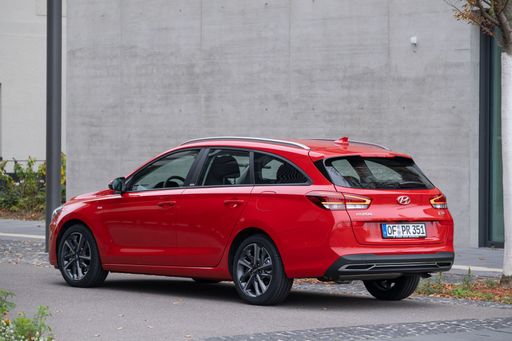 @ Hyundai Motor Company
@ Hyundai Motor Company
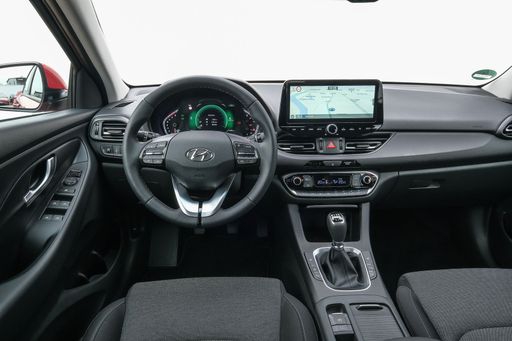 @ Hyundai Motor Company
@ Hyundai Motor Company
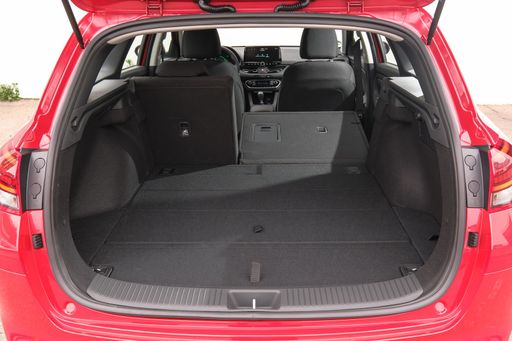 @ Hyundai Motor Company
@ Hyundai Motor Company
 @ Alfa Romeo / Stellantis Media
@ Alfa Romeo / Stellantis Media
|
 @ Hyundai Motor Company
@ Hyundai Motor Company
|
|
|
|
Costs and Consumption |
|
|---|---|
|
Price
25700 - 41600 £
|
Price
24800 - 30100 £
|
|
Consumption L/100km
4.8 - 5.4 L
|
Consumption L/100km
5.7 - 6 L
|
|
Consumption kWh/100km
15.1 - 17.5 kWh
|
Consumption kWh/100km
-
|
|
Electric Range
344 - 410 km
|
Electric Range
-
|
|
Battery Capacity
0.4 - 51 kWh
|
Battery Capacity
-
|
|
co2
0 - 119 g/km
|
co2
130 - 136 g/km
|
|
Fuel tank capacity
44 - 45 L
|
Fuel tank capacity
50 L
|
Dimensions and Body |
|
|---|---|
|
Body Type
SUV
|
Body Type
Estate
|
|
Seats
5
|
Seats
5
|
|
Doors
5
|
Doors
5
|
|
Curb weight
1380 - 1689 kg
|
Curb weight
1316 - 1461 kg
|
|
Trunk capacity
340 - 415 L
|
Trunk capacity
602 L
|
|
Length
4173 mm
|
Length
4585 mm
|
|
Width
1781 mm
|
Width
1795 mm
|
|
Height
1505 - 1538 mm
|
Height
1475 mm
|
|
Max trunk capacity
1205 - 1280 L
|
Max trunk capacity
1650 L
|
|
Payload
390 - 420 kg
|
Payload
439 - 524 kg
|
Engine and Performance |
|
|---|---|
|
Engine Type
Electric, Petrol MHEV
|
Engine Type
Petrol, Petrol MHEV
|
|
Transmission
Automatic
|
Transmission
Manuel, Automatic
|
|
Transmission Detail
Dual-Clutch Automatic, Reduction Gearbox
|
Transmission Detail
Manual Gearbox, Dual-Clutch Automatic
|
|
Drive Type
Front-Wheel Drive, All-Wheel Drive
|
Drive Type
Front-Wheel Drive
|
|
Power HP
136 - 280 HP
|
Power HP
100 - 140 HP
|
|
Acceleration 0-100km/h
5.9 - 9.1 s
|
Acceleration 0-100km/h
9.8 - 13.3 s
|
|
Max Speed
150 - 206 km/h
|
Max Speed
178 - 197 km/h
|
|
Torque
230 - 345 Nm
|
Torque
172 - 253 Nm
|
|
Number of Cylinders
3
|
Number of Cylinders
3 - 4
|
|
Power kW
100 - 207 kW
|
Power kW
74 - 103 kW
|
|
Engine capacity
1199 cm3
|
Engine capacity
998 - 1482 cm3
|
General |
|
|---|---|
|
Model Year
2024 - 2025
|
Model Year
2024
|
|
CO2 Efficiency Class
A, C, D
|
CO2 Efficiency Class
D, E
|
|
Brand
Alfa Romeo
|
Brand
Hyundai
|
What drive types are available for the Alfa Romeo Junior?
Available configurations include Front-Wheel Drive or All-Wheel Drive.
The prices and data displayed are estimates based on German list prices and may vary by country. This information is not legally binding.
